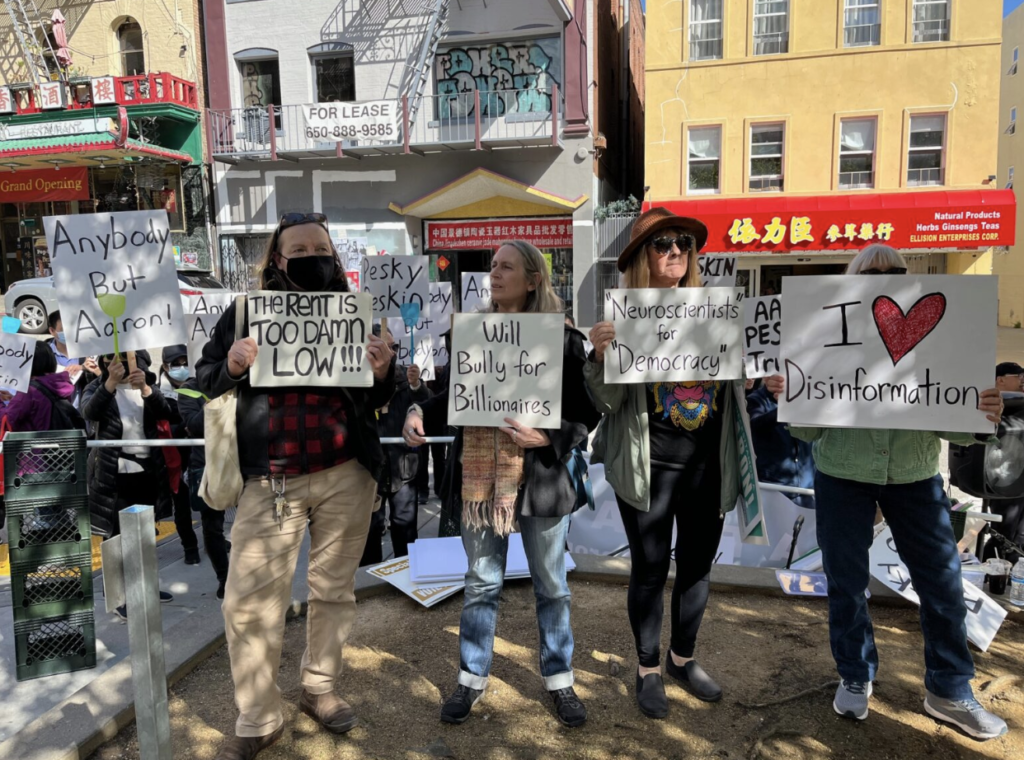So TogetherSF had to cancel its gala mayoral debate, after nobody except Mark Farrell and Sup. Ahsha Safai was willing to go.
That’s a huge embarrassment for the billionaire-backed group, which is trying to become a dominant force in local politics.

Except it’s run into a few problems, like charges that the supposedly independent group is too closely connected to the Farrell campaign. And the director of a loosely affiliated group, who is married to the head of TogetherSF, is struggling to defend himself over sexual assault charges.
And yet, the group remains clueless, arguing that the cancellation had nothing to do with its ethical issues. From Twitter:
Here’s what the whole incident actually shows: If you have unlimited money from the very rich, and an electorate that’s unhappy about the failures that the media is happy to falsely blame on progressives, you can have an impact on local politics.
(Local officials were spending a lot of time talking about fentanyl before the, again embarrassing, “fentailfe” campaign started.)
But at a certain point, even the mayor, who these same billionaires have supported, is going to realize there’s something very wrong here.
The Budget and Appropriations Committee continues its hearings on Mayor London Breed’s draft budget proposals Wednesday/22. In the meantime, Sup. Ahsha Safai wants to make the budget an issue in the mayor’s race.
Safai, who is by most accounts trailing the other major candidates, will ask Breed about her budget at Question Time Tuesday/21. Specifically, he will ask her about “Budget Cuts to Essential Programs.”
The issue here, obviously, is what counts as an “essential program.” Breed has taken the position that hiring more cops is essential, so they can arrest more people doing drugs, adding to the crisis in the county jail.
She has not, at this point, put as much effort into hiring 911 dispatchers, public health nurses, social workers, or others who play a key role in the public-safety system.
Preparing a budget is about making choices, and that means setting priorities. The city’s facing a huge deficit; something has to change. Are services for the most vulnerable more important than more police officers? Is affordable housing more important than developer tax breaks?
Are long-term financial decisions more important that short-term fixes?
That’s the discussion the city needs to have, and if Safai can get the mayor to go beyond campaign talking points and let the public know where she wants to put her priorities, it will help us all understand who will pay, and who will suffer, from this crisis.
Question Time starts at 2pm
Here’s an example of short-term and long-term thinking: The Budget and Finance Committee will consider what’s usually a routine item Wednesday/22, a 10-year and 15-year lease for space at 1145 Market Street, 599,000 a year for the law library and $588,000 for the Health Services System.
Nothing new here; San Francisco leases plenty of commercial office space for departments that don’t fit in the very limited confines of City Hall.
So that’s a little more than $1 million a year. For a total of 40,000 square feet of office space. Grand total the city will pay to Trinity Properties over the course of the lease: $14.7 million.
Meanwhile, a downtown building with 88,000 square feet of office space just sold for $6.5 million. The city could have bought it, moved these two agencies in, had another 48,000 square feet that could be used for other city agencies or turned into artist studios—and saved $8.2 million.
Plummeting values for commercial real estate may be a nightmare for private investors—but for the city, which is going to rent space anyway, there are amazing potential advantages.





